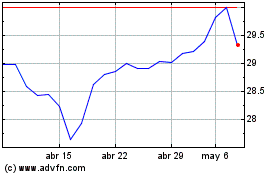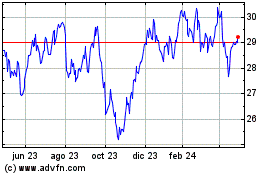Enhancing Power System Resilience : Veolia Passes the 2 GW of Flexible Power Milestone in Europe
23 Enero 2024 - 2:11AM
Business Wire
> 10 000 sites for an overall of up to 2 GW of
flexible capacity already managed by Veolia in Europe.
> By 2030, the growing development and integration of
intermittent wind and solar renewable energies into power grids
will require a 10-fold increase in flexible power
worldwide.
> To meet this challenge, Veolia announced at Deep
Dive Energy in London the goal of achieving 3 GW of flexible
electrical power by 2030 to balance the grid demand and
intermittent production.
Regulatory News:
Veolia (Paris:VIE), European leader in electrical flexibility,
passes the milestone of 2 GW of flexible electrical power managed,
equivalent to the output of two nuclear reactors or the consumption
of 2 million people. This success builds on a portfolio of almost
10,000 sites managed across Europe and a variety of industrial
customers (VPK, Thy Marcinelle, Beneo Orafti, Aquiris, Veolia Eau,
Orange, Inovyn Ineos etc.). To help meet the challenges of the
energy crisis and the integration of intermittent power supply from
renewable energies, Veolia's ambition is to accelerate the pace and
reach 3GW of flexible power by 2030.
Electrical flexibility becomes increasingly important for
ensuring a reliable and sustainable power supply in the context of
the energy crisis in Europe and evolving electrical mix, with a
growing share of renewable energies and the consequent need to
manage variability and intermittency. It helps to modulate
electricity production or consumption in real time to maintain the
balance between supply and demand and can come from a variety of
sources, such as energy storage devices, flexible power plants and
demand-side management devices.
The electrical flexibility market is driven by very fast
addition of intermittent solar and wind capacity to the grid,
creating a large and long term need for grid balancing between
supply and demand. According to the IEA, by 2030, there will be a
tenfold increase in the need for flexible assets worldwide, due to
growth in Europe (over 500GW PV & wind)1. Under current market
and policy conditions, the International Energy Agency (IEA)
estimates that the world's renewable electricity generation
capacity will increase 2.5-fold by 2030.
In addition to its contribution to grid stability, it represents
an economic opportunity for businesses, which are remunerated for
adjusting their consumption during peak periods. This promotes a
smart, mutually beneficial energy transition, offering stability to
the grid and economic opportunities to businesses.
Veolia is positioned as a European technology leader in flexible
process modeling and IoT with a dedicated R&D team. It operates
through intelligent algorithms, developed on a high-performance
digital platform, to manage and optimize diffuse load shedding,
i.e. the ability to coordinate several thousand sites that shed
electricity over a given period, in response to alerts from the
grid operator.
In concrete terms, the Group's subsidiary, Flexcity integrates
the operating constraints of industrial sites into its algorithms
via a "Flexcity box" installed on site, which receives production
or consumption data from flexible installations and transmits
activation signals using industrial or IoT protocols. This
information enables automatic activation with the least possible
impact on its customers' operations.
“Intelligent energy management is an essential pillar in the
ecological transformation of our energy systems. With electrical
flexibility, the challenge of energy reduction transforms into both
an ecological and economic opportunity. At Veolia, we consider
electrical flexibility a resilient solution for a smart energy
transition within territories. Sustainable energy management stands
tall as a pivotal pillar in the ecological transformation of our
energy systems. Leveraging Veolia’s industrial expertise, we are
empowered to deliver efficient solutions to strengthen the
resilience of our customer’s power systems.” said Estelle
Brachlianoff, Veolia’s Chief Executive Officer.
▁▁▁
ABOUT VEOLIA
Veolia group aims to be the benchmark company for ecological
transformation. In 2022, with nearly 213,000 employees worldwide,
the Group designs and provides game-changing solutions that are
both useful and practical for water, waste and energy management.
Through its three complementary business activities, Veolia helps
to develop access to resources, preserve available resources, and
replenish them. In 2022, the Veolia group supplied 111 million
people with drinking water and 97 million people with wastewater
service, produced nearly 44 terawatt-hours of energy and treated 61
million metric tons of waste. Veolia Environnement (Paris Euronext:
VIE) generated consolidated revenue of €42.9 billion in 2022.
www.veolia.com
1
https://www.iea.org/energy-system/decarbonisation-enablers/digitalisation
View source
version on businesswire.com: https://www.businesswire.com/news/home/20240123659552/en/
CONTACTS VEOLIA
PRESS RELATIONS Laurent Obadia - Evgeniya Mazalova
Anna Beaubatie - Aurélien Sarrosquy Tel.+ 33 (0) 1 85 57 86
25 presse.groupe@veolia.com
INVESTORS RELATIONS Ronald Wasylec - Ariane de
Lamaze Tel. +33 (0) 1 85 57 84 76
investor-relations@veolia.com
Veolia Environnement (EU:VIE)
Gráfica de Acción Histórica
De Abr 2024 a May 2024

Veolia Environnement (EU:VIE)
Gráfica de Acción Histórica
De May 2023 a May 2024
